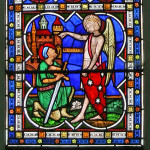We run our website the way we wished the whole internet worked: we provide high quality original content with no ads. We are funded solely by your direct support. Please consider supporting this project.

What does the Bible mean when it says God “sent an evil spirit” on certain people?
Question: In Judges 9:23, I Samuel 16:15ff and 18:10 it is said that God sends evil spirits on people. Doesn’t this support the idea that everything Satan and demons do is under God’s sovereign control?
Answer: I’ll make six points in response to this question.
1) If everything Satan and demons do is under “God’s sovereign control,” we’d have to say God has a specific good reason for everything Satan and demons do. This in turn entails that we can no longer explain any evil in the world by appealing to nefarious spirits — or even evil human decisions for that matter — for behind everything spirits and human agents do is God’s “sovereign control.” If there’s a different way of interpreting these texts, therefore, I think it should be preferred.
2) The fact that Yahweh fights evil spirits throughout the Bible is enough to suggest that spirits aren’t always under his “sovereign control.” Most importantly, all of our thinking about God must be centered on the person of Jesus Christ, and Jesus uniformly manifests the will of God by coming against evil spirits. He never suggests that evil spiritual agents are carrying out the will of God.
3) Many scholars argue that the word “spirit” used in some Old Testament passages doesn’t refer to a spirit being, but is rather just an ancient way of personifying human attitudes. So, for example, the TNIV translates Judges 9:23, “God stirred up animosity between Abimelek and the citizens of Shechem…”
4) The Hebrew word translated “evil” (rah) in these passages doesn’t necessarily refer to something morally evil. It can just mean “troubling.” So the passages may be teaching not that the Lord sent a wicked spirit on someone, but simply that he sent a troubling spirit: that is, a spirit to cause unrest between or within people.
5) Even if we conclude that the spirits sent from Yahweh are wicked, there’s no warrant for concluding from this that everything wicked spirits do is under the “sovereign control” of Yahweh. It just means that there may be cases where God’s interests and the interests of wicked spirit agents coincide.
6) Related to this, it’s important to note that whenever these troubling or wicked spirits are sent by God, it’s done as punishment for something people have done. God judges people by allowing spirit agents to do what they want to do: namely, torment people.
For all these reasons, I see no reason, based on a few passages that (may) say that God “sent an evil spirit,” to conclude that everything Satan and demons do is specifically under “God’s sovereign control.” Of course God allows their activity in the sense that he gave these spirit agents free will, just as he gave humans free will. But this doesn’t imply that God in any sense approves of what they do (though, as I said above, there may be instances where God’s interest to punish someone and the desire of fallen spirits to torment people coincides).
Category: Q&A
Tags: Bible, Demons, Old Testament, Q&A, Responding to Calvinism, Spiritual Warfare
Topics: Interpreting Violent Pictures and Troubling Behaviors, Spiritual Warfare, Cosmic Conflict
Verse: 1 Samuel 16, 1 Samuel 18, Judges 9
Related Reading

What is the significance of Acts 27:10-44?
This is the passage deal with Paul’s ill-fated voyage to Italy as a prisoner. The ship ran into very bad weather and Paul announced, “Men, I can see that our voyage is going to be disastrous and bring great loss to ship and cargo, and to our own lives also” (vs. 10). As he reminded…

How do you respond to 1 Timothy 4:1–3?
“…in the later times some will renounce the faith by paying attention to deceitful spirits and teachings of demons, through the hypocrisy of liars whose consciences are seared with a hot iron. They forbid marriage and demand abstinence from foods…” New Testament authors considered themselves to be living “in the later times” (e.g. Acts 2:17;…

The Problem with Christocentrism
As we’ve discussed in the previous posts, there has been a growing move toward a Christocentric orientation in theology since Barth, and especially over the last fifty years. I enthusiastically applaud this trend, for I’m persuaded it reflects the orientation of the NT itself, so far as it goes. The trouble is, it seems to…

What is the significance of Jonah 1:2; 3:2, 4–10; 4:2?
God “changed his mind” (3:10) about the destruction he planned to carry out on Nineveh. If all events in history are eternally settled and known by God as such, his word to Jonah that he planned to destroy Nineveh in forty days was insincere as was his inspired testimony that he in fact changed his…

Book Review: Understanding Spiritual Warfare: Four Views
I just got the pre-release copy of Understanding Spiritual Warfare: Four Views, edited by my friends James Beilby and Paul Eddy (IVP, 2012). The introduction alone is worth the price of the book! It is the clearest, most comprehensive, yet most succinct overview of the concept of spiritual warfare throughout church history that I’ve ever…

A Dialogue with Derek Flood Part 2: Is ALL of the Bible Inspired?
Image by TheRevSteve via Flickr Yesterday, I offered the first part of my response to Flood’s comments regarding my review of his book. Today I’ll finish up my thoughts. Scripture and Its Interpretation Flood confesses that he is confused as to how I can claim that “in the light of Christ, we must reject violent interpretations of Scripture”…
